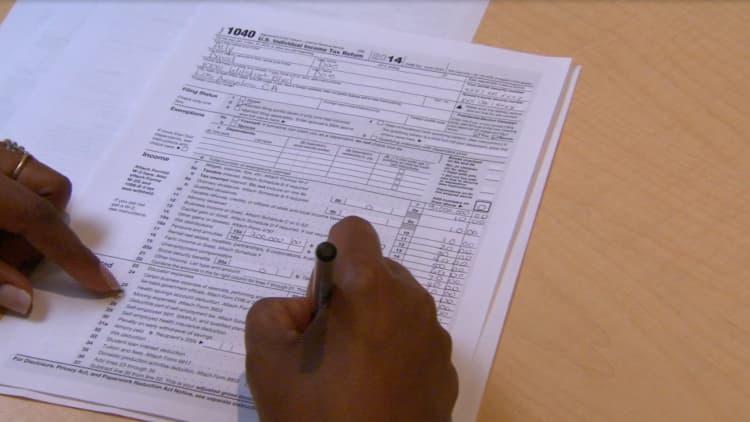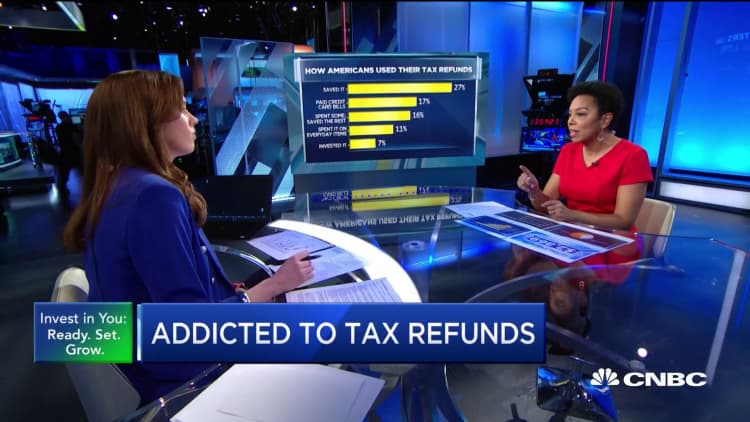Chances are that the IRS has a check with your name on it — and you still haven't picked it up.
Taxpayers have about a month to file their 2019 income tax returns and pay any taxes owed to Uncle Sam.
July 15 became the new Tax Day after the Treasury Department moved the deadline to help Americans who were facing disruption amid the coronavirus pandemic.
Indeed, taxpayers have been taking it slow. Households filed 135.2 million individual income tax returns as of the week of June 5, which is down by nearly 6% year over year.
Refunds await many taxpayers. The IRS issued 91.3 million refunds as of June 5, delivering an average $2,769.

If you have a simple return, get to it.
"I think everyone wants to get those returns done, especially those who are looking at refunds," said Dan Herron, CPA and principal at Elemental Wealth Advisors in San Luis Obispo, California. "There's still a huge demand to get those back so they can get some cash in their pocket."
Filers who don't think they'll turn in their paperwork by next month can request an extension.
That would give them until Oct. 15 to submit returns, but they'll still need to pay any taxes owed by July 15.
Summertime deadlines
Individuals submitting last year's tax returns aren't the only ones with a due date in July.
People who pay quarterly estimated taxes – for instance, independent contractors – were also given until July 15 to cover amounts due for the first and second quarters of 2020.
Ordinarily, those deadlines would have been April 15 and June 15, respectively.
Further, Americans abroad, who would have normally had until June 15 to submit their 2019 tax return, now have until next month to file and pay taxes due.
The IRS compiled a list of spring deadlines that have been pushed into July here.
Just as filers have more time to turn in last year's tax returns, they also have extra time to top off their savings accounts.
More from Smart Tax Planning:
Thinking of being your own boss? What it means for taxes
Why businesses aren't rushing to claim the $130 billion PPP pot
Five key takeaways for small business owners, post-PPP
You have until July 15 to save up to $6,000 in your individual retirement account (plus $1,000 if you're age 50 and over) and have the contribution count for 2019.
Many savers can also claim a tax deduction for making that IRA contribution, based on their modified adjusted gross income for 2019, even if they had a retirement plan at work.
If you were in a high-deductible health plan, you can also stash more money into a health savings account.
You normally save in an HSA on a tax-deductible or pretax basis and have your money grow tax-free over time. If you use the proceeds to cover qualified medical costs, you can do so tax free.
For 2019, the maximum contribution is $3,500 for self-only coverage ($7,000 for family plans). Accountholders turning 55 can throw in an extra $1,000.
Last-minute breaks

Take these remaining weeks to scour for extra opportunities to cut your tax bill.
For instance, you might qualify for a couple of "tax extenders," a package of tax breaks that must be renewed by legislators each year.
Those write-offs include a $4,000 deduction for tuition and fees for your college student — and you don't have to itemize on your taxes to scoop this one up.
You won't know whether you qualify until you perform an inventory of your statements from last year.
Taxpayers should also pay close attention to what's going on at the state level. While most states have pushed their filing deadlines to July 15, not all of them have.
Filers in Virginia, for instance, were supposed to pay individual and corporate income taxes by June 1.
The American Institute of CPAs keeps a list of states and their deadline updates here.





